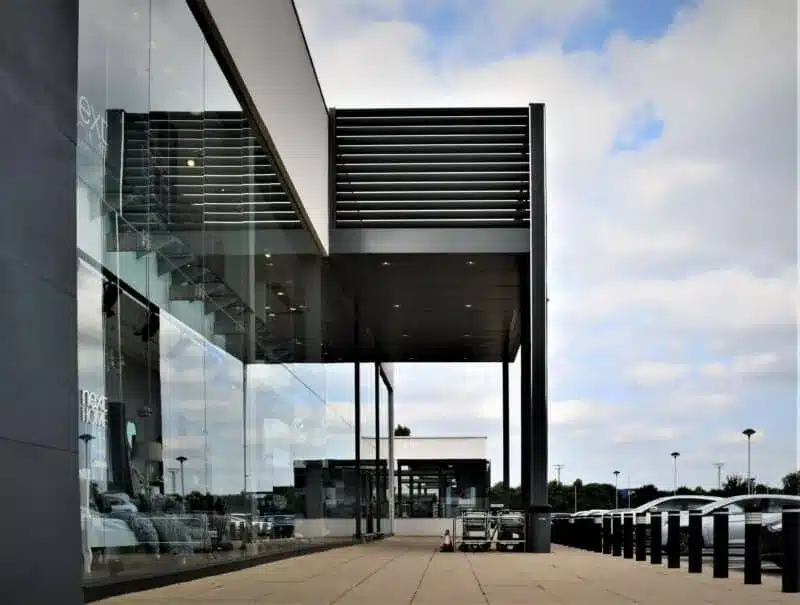The second quarter of 2024 in Poland’s retail market was marked by significant developer activity. Retail parks continue to be the preferred asset segment, while the trend of demolishing shopping centers is creating opportunities for new residential and office investments, according to experts at BNP Paribas Real Estate Poland in their report “The Modern Retail Market in Poland.”
In Q2 2024, the Polish retail market expanded by approximately 135,000 sqm of modern retail space, which included both the opening of new facilities and the expansion of existing ones. As of the end of June, around 335,000 sqm of new retail space was under construction, along with about 110,000 sqm of space undergoing expansion or format changes.
The highest saturation rates of modern retail space remain in the Wrocław and Poznań agglomerations, with levels of 1024 and 973 sqm per 1,000 residents, respectively, while the lowest rates are observed in the Katowice conurbation and the Łódź agglomeration (723 sqm and 699 sqm per 1,000 residents, respectively).
Retail Parks Still in High Demand
Between April and June 2024, nine new facilities were completed, three existing facilities were expanded, and three facilities were redeveloped. Only one shopping center, Galeria Starówka in Leszno, expanded the retail space in this segment in Q2. Meanwhile, Dekada in Grójec and the Nowa Górna retail park in Łódź were expanded by 5,000 sqm and 3,000 sqm GLA, respectively. Three former Tesco buildings were redeveloped into two retail parks in Bytom and one in Piła.
The retail park segment dominated new openings once again, with new parks established in Jastrzębie-Zdrój, Olsztyn, Świebodzin, Tychy, Zawiercie, and Zgorzelec. Three retail park transactions were recorded in Q2 2024, involving four facilities, including two in the Warsaw agglomeration (Łubna and Grodzisk Mazowiecki) and two in Kłodzko and Kępno. This type of asset is still seen as relatively stable and safe by investors.
Changes in the Mature Shopping Center Market
BNP Paribas Real Estate Poland experts highlight that Poland’s modern retail market is constantly evolving due to its maturity and saturation with retail facilities. As a result, some shopping centers in Polish cities have already been demolished, others are awaiting demolition, or their fate is still being decided.
“The main reasons for demolishing retail facilities were declines in turnover and customer numbers or new investment plans by property owners,” says Fabrice Paumelle, Head of Retail at BNP Paribas Real Estate Poland. “Currently, Galeria Malta in Poznań is being demolished, likely to be replaced by residential units. In Wrocław, the demolition of Arkady Wrocławskie is set to begin this year, to be replaced by a modern office building with residential space. Shopping centers will not disappear, but we will see an intensification of various activities – from re-commercialization, renovations, and modernizations to expansions, redevelopments, and changes in function, to demolitions to reclaim land for new investments.”
Non-Trade Sundays Boost for Discount Stores
An aspect that could significantly impact the market is the proposed liberalization of Sunday trading regulations. The bill, which passed its first reading, proposes two trading Sundays per month, double pay for work on those days, and the requirement to grant a day off within six days before or after a working Sunday.
Contrary to the lawmakers’ intentions in 2018, the Sunday trading ban did not support small local shops in competing with large retail chains. According to GUS data, the estimated number of stores decreased from nearly 340,000 at the end of 2018 to just under 326,000 at the end of 2022. This means that over four years, the number of stores decreased by 14,000. Discount stores and smaller formats have become Poles’ first choice after the era of supermarkets and hypermarkets.
“The last few years have seen the rise of discount chains, which have gained loyal customers through aggressive marketing and pricing strategies and long opening hours. The current Sunday trading ban regulations are full of arbitrary exemptions that can be prone to abuse,” emphasize BNP Paribas Real Estate Poland experts.
Social Selling – A New Engaging Trend in Online Sales
In May, e-commerce accounted for 8.6% of retail sales. In the first half of the year, the level of e-commerce in individual months did not fall below 8%. The most popular online shopping categories remain press, books, textiles, clothing, and footwear. BNP Paribas Real Estate Poland experts note the growing popularity of social commerce – sales through social media platforms.
“Utilizing social commerce features can give companies a competitive edge in the e-commerce world. Unlike popular marketing strategies, it relies on active engagement, attractive product presentation, and expanding the audience, which helps increase sales and build customer relationships,” comments Klaudia Okoń, Senior Consultant at the Business Intelligence Hub & Consultancy Department at BNP Paribas Real Estate Poland. “Social commerce also allows users to make purchases quickly and conveniently. By storing payment or address data in the social media platform’s database, the purchasing process usually requires only a few clicks, eliminating the need to repeatedly enter this information.”
